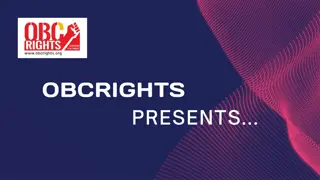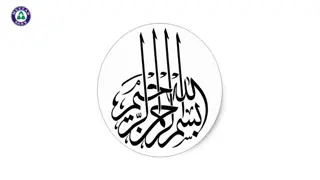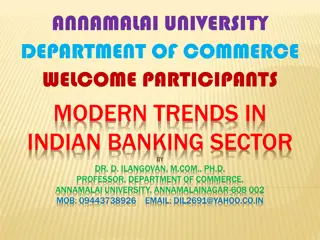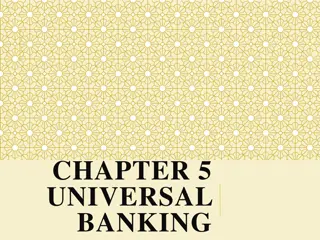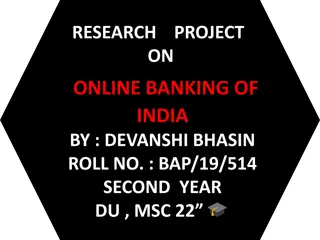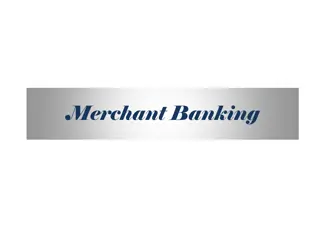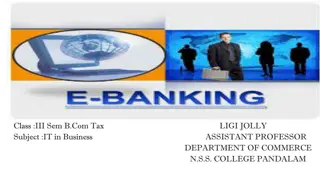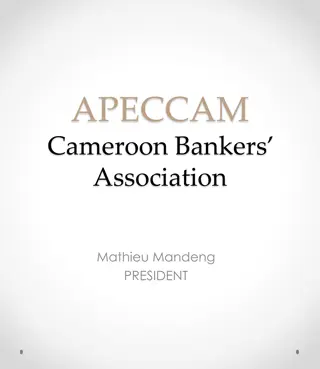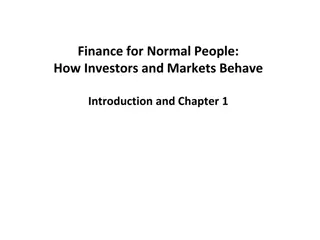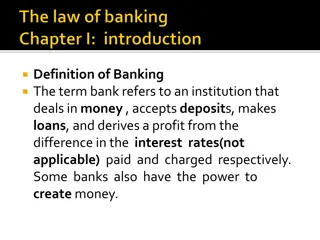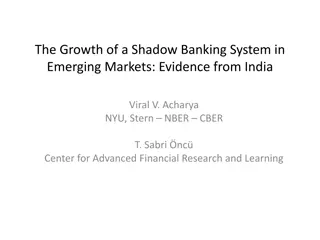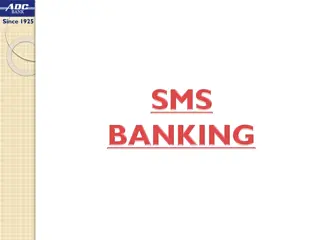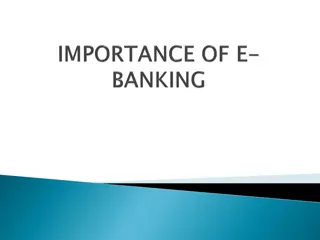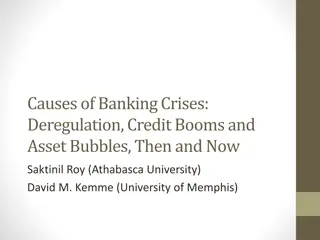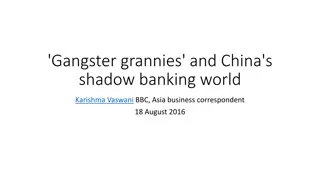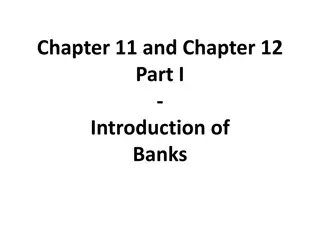Understanding Banking Terms and Services in Finance
Explore the world of banking in finance through topics like interpreting banking documents, understanding banking terminology, determining bank charges, and investigating various types of bank accounts. Learn about credit and debit balances, overdraft facilities, ATMs, ETFs, and different bank charges. Discover banking services such as automatic payments, debit order services, and stop orders, as well as types of accounts like savings accounts, fixed deposit accounts, cheque accounts, credit cards, and debit cards.
Download Presentation

Please find below an Image/Link to download the presentation.
The content on the website is provided AS IS for your information and personal use only. It may not be sold, licensed, or shared on other websites without obtaining consent from the author. Download presentation by click this link. If you encounter any issues during the download, it is possible that the publisher has removed the file from their server.
E N D
Presentation Transcript
TOPIC 4: Finance Section 4.5: Banking
Topic 4: Finance The following sections will be covered: 4.1. Financial documents 4. 2.Tariff systems 4.3. Income and Expenditure profit/loss, budgets 4.4. Interest 4.5. Banking 4.6. Taxation (VAT)
Banking In Section 4.5, learners will be able to: Interpret banking documents and understand the terminology used in banking. Determine bank charges for different types of accounts using given tables and formulae. Investigate the following types of bank accounts: Savings account Cheque/current account Fixed deposit account Credit account and debit account
Definitions Credit balance shows that you have money in your account. Plus (+) indicate credit. Debit balance shows that you owe the bank some money. Minus (-) indicate debit. Overdraft facility is a loan from a bank that allows a debit balance on your account. ATM is an automatic teller machine. ETF is an electronic transfer fund. Debits the amounts of money taken out of your accounts. Bank charges all the charges and fees made by the bank to their customers.
Bank charges Forms of bank charges: Admin fees the fees the bank charges to manage your account. Transaction charges a fee charged when an amount is deposited or withdrawn. Interest for overdraft or debit balances. Charges for debit orders and stop orders.
Banking Services Bank Services: basic services that the bank can perform on your behalf and on your instructions. Types of Banking Services: Automatic monthly payments payments made by the bank on your behalf. Debit order service provider issues an instruction to your bank to make a payment to them, Stop order a fixed payment, that does not vary from month to month made by you to your bank.
Types of accounts Types of Accounts A saving account money withdrawn or deposited at any time without any notice. A fixed deposit account money deposited that cannot be withdrawn for a certain period of time. A cheque account provides funds for withdrawal or payment. A credit card allows you to buy goods aand services now and pay later. A debit card alternative payment method to cash for making purchases.
Activity 1 cont. Use the Bank statement of Miss Lang in the previous slide to answer the following questions: a) What type of account is this? b) What is the account number? c) What do the words opening balance mean? d) What is the time period for this bank statement?
Activity 1 cont. e) Identify all the bank charges on this statement. Calculate the total paid for bank charges. Identify all the credit transactions. Calculate the total for all the credit transactions. f) g) Is the closing balance a debit or credit balance? h) What is the difference between a debit and credit balance?
Solutions Activity 1 a) Savings account b) 126884587 c) The amount of money in the account as at the end of the last month and the first day of the current month. d) One month. e) Transaction charge R15,00 Transaction charge R 6,00 Transaction charge R 3,00 Admin Fee R 14,00 Total fees R38,00
Solutions Activity 1 cont. f) Cheque deposit RD Games R453,45 g) Credit h) A credit balance is a positive balance of your own money in the bank. A debit balance is a negative balance and it means you owe the bank money.
Final Assessment Questions Mulligan Bank Mr Gerald de Villiers 43 Rand Street Cape Town 7700 Date 1/1/09 3/1/09 5/1/09 5/1/09 Account number 23456799 Claremont Branch SWIFT address: SBZA TY 66 Your Statement for January 2009 Details Opening Balance Deposit Payment: Con Cars Payment: B. Benassi EFT purchase Payment: S. Yusuf Salary Debit Credit Fee Balance 12 783 56 13 768 56 12 889 61 10 887 11 1 000 00 15 00 2 50 2 50 876 45 2000 00 12/1/09 26/1/09 28/1/09 125 60 2 600 00 1 00 2 50 10 760 51 8 158 01 19 718 01 11 560 00
Final Assessment Questions The following points are for the Mulligan statement in the previous slide: (Note: EFT is short for Electronic Funds Transfer) The fee for deposits is R2,00 plus R1,00 for every R100,00 Stop order payments cost R2,50 regardless of the amount. Card purchases cost R1,00 regardless of the amount Rent is Gerald s biggest expense.
Question 1 Use the bank statement in the previous two slides to answer the following questions: What is Gerald s opening balance?
Question 2 Gerald is sure that there is a mistake in the fees column. Find and correct it.
Question 3 If the error is corrected, what should Gerald s closing balance be?
Question 4 How much rent does Gerald pay each month?
Question 5 How much money did Gerald spend this month on bank fees (assuming that the error was corrected)
Question 6 Tax of R2 440 has already been deducted from Gerald s salary. What percentage of his total salary is he paying?
Question 7 Is Gerald better off at the end of January? Give a reason for your answer.
Question 8 The biggest fee is charged for a ..
Question 9 Which transactions are for the stop order payments, which charges R2,50.
Question 10 What is Gerald s biggest expense?
Solutions Final Assessment R12 783,56 The error is in the deposit fee. Fee amount should be = 2 + (1000/100 x1) = R12 If the error is corrected, his closing balance have to increase by R3. Balance = R19 718,01 + R3,00 = R19 721,01 4. R2 600,00 5. Total spent on fees = R12 + R2,50 + R2,50 + R1,00 + R2.50 = R20,50 1. 2. 3.
Solutions Final Assessment Salary before tax = R11 560 + R2 440 6. = R14 000 Tax percentage = 2440/14000 x 100 = 17,43% Gerald is better off, because his closing balance is higher than his opening balance. Deposit Payment: Con Cars and Payment: B Benassi 10. Rent 7. 8. 9.







